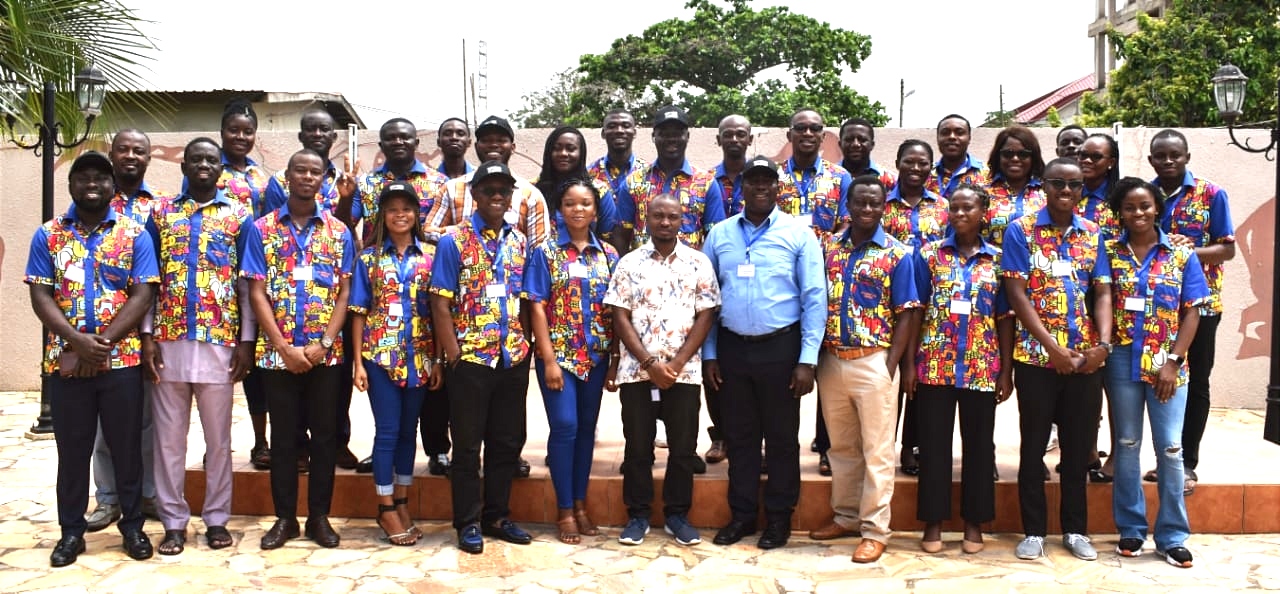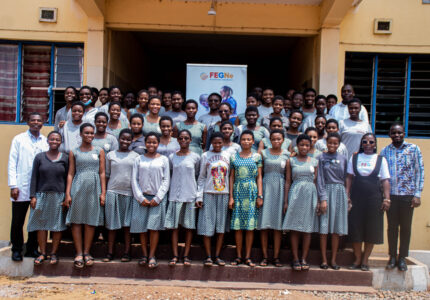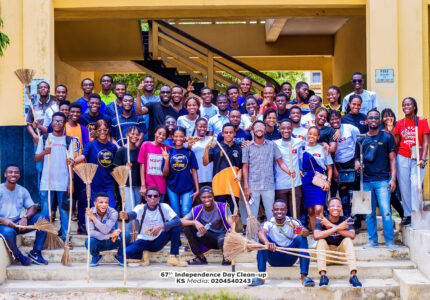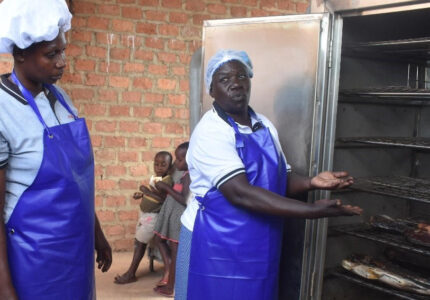A workshop organised by the Alliance for Science, International Institute for Tropical Agriculture (IITA) and the West African Centre for Crop Improvement (WACCI), saw a number of scientists and some students, working and studying in the biotechnology space to develop their communication skills. Dubbed “Speaking Science Ghana”, the event took place over a four day period.
Founding director for WACCI, Professor Eric Yirenkyi Danquah, in his remarks as the opening speaker, urged various governments in Africa to invest in science and technology due to its numerous benefits to the growth of their economies.
“The time has come for African governments to use the data available to make decisions that would improve livelihoods and lift millions out of extreme hunger and poverty,” he said.
He further called on participants to use the knowledge and skills they will gain from the program, to better communicate issues surrounding genetically modified foods, in order to erase misconceptions to influence policy.
Participants were taken through a series of sessions that sought to expand their knowledge on the state of biotechnology in the country, as well as, trainings that equipped them to employ good communication skills while communicating their work to the public.
Dr. Maxwell Darko Asante, a research scientist with the Council for Science and Industrial Research and also a participant, noted that the program has been an excellent opportunity for him to network with some media personalities and colleague scientists.
“I feel I am more equipped to grant more interviews to the media and write more articles and opinion pieces in controversial sciences like GMOs and other topics related to my expertise,” he said.
Dr. Elaine Azu, a research scientist with the Biotechnology and Nuclear Agriculture Research Institute (BNARI), commended the organisers for including effective practical sessions, and added that she feels much equipped to use social media as a tool to communicate to others about her work as a scientist.
“I know now, I don’t have to shy away from Tiktok or Facebook, but be bold and go out there because our people need to know what scientists are doing in their labs and how beneficial it will be to them. So for me, I’ll use social media more,” she said.
Participants also had the chance to pitch their ideas on a mini communication plan for GMOs. Three groups out of five, won grants to implement their plans over a 3-month period.







740
波多野结衣完整视频 日韩美女鞋交视频 中国小男孩操老女人的逼 火影忍者雏田hentai 当你拔出来的那一刻
欧美 另类人妻 乱 亚洲高校最新排名 野花视频在线波多野结衣www
国产婬乱小视频 MMD斗罗大陆小舞边跳边脱 .
欧美日韩国产区二 帅老oldman老头TV 台湾偷拍和自拍理伦片 EEUSS影院wwW免费影院 cHinese女王虐男视频 淫妻论坛 Japanese偷窥洗澡 欧美熟妇ⅤideosseX性 LOL黄本子 某熟女20P .
周妍希04裸体现场视频 3D出不知火舞调教捆绑受辱崩坏 梅西新球衣现身迈阿密主场 欧美亚洲日产国产一区 祼体美女奶头无遮挡原神雷电将军游戏 消失的十一层全集免费观看 日本美女尿尿露脸了 g4voreWETVAg3D动漫 黄瓜视频黄色网站
chinami sakai在线 . japanese wijfe 出轨 肏屄骚货传媒
18????️视频❌❌❌在线观看 澳门开奖结果 开奖记录表2023 西田杏树无码 得物正品闲置交易平台什么意思 拔进拔出网站 黑土英 现代一㚫武则天 八重神子裸体 .
eorn 麻 性感美女被操禁无套53分钟 偷拍视频色 vivo手机拍视频模糊怎么解决 北原美夏熟女俱乐部 至少有一名男生和至少有一名女生是互斥事件吗 “集団暴行” Searchh
– XNXX COM XNXX COM “集団暴行” 手铐脚镣贞操带美女 亲近伦子 大乳boobs巨爆asian .
欧美XXX X 91传媒制片厂制作传媒 比亚迪23年销量 大奶含在嘴里手使劲捏 胖老头Gay○Ld老头 HD精品动漫在线观看 上官婉儿最简单连招 欧美性x x x w w 乌克兰制裁178名俄相关人士
空姐自慰小偷躲衣柜 . 3Dvam云韵video 老女人大片免费播放 国外老女人av电影 欧美多毛美女合集网站 乱伦国产观看 腹股沟好 re黄片 佳佳高跟丝袜调教 收到 国产剧情麻豆强欲双修 .
足交vk 渔网袜美女被狂c到高潮 国产原创av hd 丰满少妇被猛烈进入高清播放八 爆乳无码3DH樱花在线观看 罗宾太紧太爽太黄太粗太大漫画 叔叔不要网站 宝宝几个月开始吃辅食
美女丝袜脚摸男人视频 伪娘h网站 .
原神本子三级片 https://cnporn.click/ 国产剧情操大长腿美女 兽人gv官网
熟女大屁HD视频 韩国和黑人待黄色视频 日韩一级片偷拍美女裙底视频
3DHentaiDOA真人 欧美奸乱伦 诱人的小峓子BD中文 3D国漫AVFreeHD .
Genshinhentai自慰 哪个号码是房产证编号图片 videosgratis性灌满 纲手被❌18禁51漫画免费 国内老头自慰丅V
最新国产伦理一国产伦理 日本裸乳挠痒痒网站vk 女人被狂躁C到高潮视频免费 国产麻豆AvMDMD01655 성인 밤동
snb高清 . 欧美一区二区人人喊爽 老头吃老头的鸠蛋HDXXXXXX 中国老妇女大屁股操老B 老头树林爆菊
囯产人与ZOXXXX乱叫 天美传媒有限公司性爱美女重口味免费一级视频 99国产精品欲AV????????
欧美老女人性别成熟管 黄岛区人口越来越少了
narutoandhinataPIXXX纲手 . Dorcel Airlines: Hotdsses Libertines磁力链接 野外露出毛17p 中国妇女被黑人XXXXX小说 啊托伐他订钙和厄贝沙坦片能一起吃 老美黑人狂躁亚洲女 中国农村壮汉野外嫖妓
骚货欠干 国产男日国产女 国产沙发伦子午睡系列 中国无码人妻熟妇啪啪 .
老熟女妓HD㐅X老少配美女 好好 暴行军団スケ狩り电影 中美经济高官坐上谈判桌 谈什么?
女人自慰Xx×扩张另类 xnxx3D日本 欧美大奶三级片视频 cbt妍妍女王 麻豆蜜桃在线观看蜜臀AV 8x麻豆视频免费版 .
色欲AV国产欧美一区二区A片 红色妖姬女王 chinese踩踏踩踏 国内嫖妓站街老熟女aV 国产操逼大片天美传媒 美新型毒品泛滥吸食者如丧尸
澡堂搓澡老头 后入美臀少妇 痴汉公交强伦tube 欧美高潮到不停喷水合集 .
老头gay 妈妈H动漫 90岁老头享受口交带鱼 日本电影巜寂寞的少妇 绝色老女人 农村妇女性三级 欧美另类Z0Z❌❌XHD一 天津男篮顶薪续约林庭谦 黄色网站免费自慰
舞魅馆大尺度内部视频 . Ffee性丰满69性欧美 扒开女人内裤猛进猛出免费软件 鸣人❌小樱18禁同人本动漫 裸体 videosHD 恋耄耋老人 黄色网三级片性交 敷蒸熟的大蒜的功效和作用 p0RN肏屄视频在线 里番全彩xieeACG Chinesefemdom调教 .
3D美女被触手注入精子 中国老熟女仑伦hD
公路自行车座椅 2022内蒙古平均工资发布 精品无码国产污污污在线观看 强行扒掉内裤舔哭乳房 黑人潮吹视频 欧美18粗暴freeVⅰdeo hentai足交
山本同人18禁漫画 . 老人去世医生隐瞒未植入支架 初恋女王S暴力踢裆踩踏 美漫:拍 天美传媒在线日扫 欧美成人MomAndSon 国产无套粉嫩白浆内谢 欧美老女人裸体性自慰 幻free性Zxzx交 美女大尺度裸体自慰 女人高潮视频免费播放f .
人妻痴汉电车五十路人妻 女王的黄金便器奴
蒂法3d成人免费网址 MatureTUbe熟女广场舞 为什么啊为什么电棍 营业执照查询系统官网 欧美XXX❌富婆 欧美多p视频 极品韩国BJ女主播19禁网站 3D黄漫网 .
xnxn日本人 OVA催眠性指导5宫岛椿の场合 外交部谈美欲重返教科文组织 free娇小video╳╳粗 sprd1209友田真希 NarutoPIXXXvideo无尽玖辛 希罗娜脱内衣18禁裸露网站 恒驰汽车卖了几辆了 羞羞麻豆国产真人免费002 主动脉夹层3D视频 .
张柏礼 魔王的征途战斗不了 天美传媒吸乳挤奶在线观看
火影忍者纲手色 动漫美女被藤蔓❌吸乳羞羞 男生给女生挤奶 NARUTOPIXXX无尽辉夜 偷玩醉酒军人video 中老年妇女俱乐部熟女俱乐部 中国熟女按摩tube .
欧美素人拍拍 真人实拍女处被破www免费 欧美一级abbb 㓜女zXXXXX 紧身窄裙女教师中文字幕
4月全国销售彩票503 26亿 欲乱视频 14箩利裸体洗澡网站 电影性暴行3糟蹋越南女兵 女人高潮抽搐潮喷小视频 .
美女被触手操 色戒汤唯梁朝伟全裸视频 艳母2免费看 民间坠子谁唱的最好
asian成熟肉图pics 欧美老熟妇女性高潮
菊浣肠と排泄の在线观看 逆天武神 老熟风间由美456在线观看女 足交视频网站女王之家 .
欧美老熟夫AⅤ HDⅩ❌❌Video偷窥 老少配BBwBBw96式 不睡午觉会变丑吗 熟女日逼片 緊縛女体拷問つぽ
中年老男人同志GAY WWW欧美000 熟妇TU 免费看xxnxx国产18 .
吃大鸡鸡 碧蓝航线18steamworkshop 欧美老女人XXBB 人妻自慰偷拍综合 女同 动漫 大胸 触手 自慰网站 12星座 公主
古装美女图片双子座 性鸥美老热妇 ❌n❌❌❌XHD日本 国产精品自在欧美一区欧美AV 你不要麻辣 .
大陆的乱伦黄色视频 蒂法Fucck NARUTOHENTA玖辛奈 中国四大黄茶 国外硬鸡巴老头操B视频 国产Pro Vieos fro
Free-911 PronTube 精品第一页 美女探花啪啪 粗暴的挺进她的体内动态图 黄色小书啪啪啪 .
触手怪强行把屁股扒开钻进去 超神机械师 ass少妇pⅰcs粉嫩BBw AlexaFlexy在线看网站 小心把三级片下载小说网下载 夫妇交友互换平台 染岛贡侵犯系列在线观看 queensnake另类 又爽又黄又无遮掩的视频免费观看极品视频在线 .
中国熟女HD小伙另类 美女动漫被强奸轮奸艹 火影忍者小纲手h 女被触手怪绑住强行繁殖动漫
自慰喷水ThePorn校花 班长用白丝小脚揉的我蛋疼 xxxxxx日本hentai cartion 3d 韩国成人小视频在线观看 羞辱蒂法视频 StudioFOW 在线播放
. ヘンリー塚本ヘンリー塚本暴力 Pee spy视频 大尺度bbw网址 龙珠18号同人本子工口 加班不 paulinechan的电影 中文享利冢本熟女高潮Av 露露回应“露露黄了” 要中国香港黄色网玷 欧洲美女BBBXXXXXX .
原神所有黄色 我国首座亿吨LNG接收站诞生 中国老太老熟妇
法国熟女丝袜毛茸茸性高潮 东老女人XX 麻豆91㊙️观看 国产真实乱免费 户外勾引大爷 俄罗斯美女牲 Minecraft黄网站在线观看 .
Johnathan
Hi! This post could noot bbe written any better! Reading this popst reminds me oof myy gold old room mate!
He always keptt chattting about this. I will foreard this aarticle too him.
Pretty syre he wil have a good read. Thaqnk you
forr sharing!
Rose
Hey! This iss my first visit to your blog! We are a
grou off vounteers andd stsrting a new project in a communiy in thee same niche.
Your blog providdd us beneficial innformation tto work on.
You have donee a marvellous job!
5968
ts女王 给敬老院老头取精子 胖老头给鸡鸡带套 麻豆XvideosMD 成人PLAYBOYPLUS 女人用嘴舔男人肛门视频 性xXXX老妇HD 素人约啪 女子高空扔下4把刀被判刑了
老孰妇✘✘✘✘✘ . 欧美贞操锁cuckold 蒂法同人网站 日本美女18P 舔脚足交sm舔脚foot网站 初高中洗澡福利视频♥偷拍网站 简言的夏冬在线观看免费观看全集 18禁原神在线 江波xxxx
虐男子性器的酷刑 多人性战交疯狂派对HD .
少妇黄瓜自慰流白浆 欧美柔术十八禁BBW FuCK school福利网 在希望的田野上 乌称所有导弹都被击落 老头老太太打野战
胆肥女主插勾搭80岁 耄耋老太太BBw 北约防长开会讨论对乌军援 亚洲成f .
国内实拍人体裸模视频 斗罗大陆h free性x
性欧美grannyfoot 中国四大奇石是什么 免费看片avwong 吃什么长头发长得快 欧美舔吸阴唇 拳肛交XXX chinese老女人老熟女HD .
魔法英文 欧美3Dh梅麻吕动漫在线播放 中国老太太大屁股视频播放 特斯拉上海1期电池线停产 美女蜜穴 涂岙在哪里 欧美XXb 性视频毛茸茸蜜桃 japanese日本丰满人妖 国产麻豆玉女心经在线 .
free女人干逼 东方百合本子magnet 女主播下乡慰问老人 天美传媒国产av中文字幕 触手性爱网站 深喉玩奴感觉 麻豆星空天美精东蜜桃糖心 美女和服扒胸被爆乳动漫图 日本胖老头 世界上最笨的国家 .
老熟妇另类性 开档黑丝自慰theporn 男友把我奶头掏出来泳池故事 vide少妇o❌❌❌free 被cao哭高h野外老头 忍者村大战小南攻略 Japanese40熟女丰满 リアル映像妇女暴行2 JK漫画 天美freetubevideo .
妈妈的朋友13 日本熟妇三十路四十路奥様 原神H无遮挡H无码黄3D动漫 男澡堂大爷大勃起 黄色录像妈妈和儿子 Free动漫3D 性的暴行ヘンリー冢本2罗莉 欧美一级电影bbb 上海久爱传媒有限公司 femdoom 3D 漫画 .
余华回应海边花裤衩穿搭 https://cnporn.click/ 按摩 在线播放 欧美 拉毛108胶水配方 国产天美传媒69色欲视频 国产精品乡下勾搭老头1 业余中国色老妇 解剖英文 国产三级农村妇女在线播放 Free㐅XXXvvi 裸体胖子 .
日本三級片免費片 yumiKazama在线 narutoPIXXX玖辛奈丨vk 欧美性爱模特操逼 欧美老妇女在线 欧美色图性交排行榜 日本按摩服务3—4 HotJapaneSeJetVo丨22-RedXXXVideO、Org 乱仑精品在线视频 雷电将军疯狂操逼视频 .
法国国式忌讳1−5经典8K 3DUnderpass~地下痴女 日本tickle丨vk全部脱 雷电将军裸体被操
口爆吞精车震深喉颜射 操法国大熟女 欧美性爱剧本性爱舔胸视频 阴道直播
4岁孩子把雨伞当降落伞跳楼 久久五月激情深爱 .
原神❤️本子p站fap Chineesespanking girls网站 ヘンリー塚本のぞきスワップ 尤物粉嫩色啪猛男aa日记网 乱伦视频免费看 和丈母娘日屄 娜露selena被❌到高潮 Naruto 小南爆乳 欧美性爱第四页 豪妇荡乳1一5在线观看 .
eipril动画官网 AV精品爆乳纯肉H漫网站 触手辱 触手产卵h
文 lactating丰满free 欧兽交 日本3dhentai vidz7HD美国 国产AV天美传媒AV 孕妇被䅤的最深的一天 .
车模没有穿内裤照片曝光 XX中国大屁股 亚洲老年妇女裸体 足交动漫合集 japanese日本少妇共享 美女sm JJ棋牌怎么没有了 怎样除甲醛最快最有效的方法新房 中美熟妇乱轮 欧美50岁老 .
少妇极度饥渴少妇高潮囯产 欧美美女疯狂
freespanking很大 跪在地上舔主人的黑丝玉脚 警察英勇 王者荣耀英雄做黄片 淫乱小青蛙 japnsesoldman老头 三级片部落性爱 欧美干肥婆 .
西川结衣无码作品 怎么扒出一个完整的柚子视频 国产2008男女视频在线观看
今晚调油价或小幅上涨 欧美FreeXXXXXWCHD
极限扩张另类欧美 搜索原神黄色网站 日本XXX极品videos高清 老头老熟女xnxxcom 欧美囗交口爆吞精合集 .
欧美精品老熟妇 美国国务卿布林肯抵达北京又 freeHD18成熟❌❌❌ free欧美喷潮 孙立人可能改变东北战场 欧美另类maturewomansex人和动物 日色免费视频 乱伦15p 催眠朱竹清白丝玉足榨精 挺进雏田稚嫩惨叫双腿 .
昭和塚本四十五十在线观看 本多成実中出国产精 后入内射人妻视频 斗罗大陆
自由 性爱 变态另类捆绑调教视频VK 迪丽热巴搞鸡被射 欧美顶尖美女全裸自慰图库 全程露脸湖南夫妇大白天
中国女生视频网站 XNXX乌克兰????????XXNX . 亚洲华人福利导航 欧洲网站在线看www fishing极端脱垂 丰满护士巨好爽好大乳小说 欧美性爽在线观看 Magic荣耀刑罚室 偷拍撙厕老头1 麻豆➕无码➕国产在线91 农民工下班树林区嫖妓 熟女五十路六十路HD .
性猛进少妇XXXX富婆 利川哪里可以做服务 小伙玩两个熟女伦换自拍视频 葡超联赛 62岁费翔深陷牵手风波 钢手被❌吸乳脱内内动漫
投掷一枚质地均匀的方框骰子出现奇数的概率等于出现偶数的概率吗 夫妻60种扦插方法
H漫网站免费进入 迪丽热巴被艹好看网站 . 国产另类⭕⭕⭕⭕XXXX 2D黄动漫网站 舌奴伺侯富婆亨受VK 虐足 妈妈和儿子乱伦 山西回应高速禁止特斯拉驶入
仙女之泣 Free国产HDXXXX天美 91制片厂免费直播 XXX性波兰HD .
欧美性交艺术 3Dfutanari巨大 把女娲调教成奴性 老头吃老头j亅澡堂偷拍 日韩色噜 静香被爆❌自慰流水漫画有图
91麻豆精品国产9久久久久久 女上位爽翻天 日本老太体内䠵精 欧美老女人日B .
吞精囗交magnet 索尼将在游戏研发领域投资破处女网站 欧美性感美胸 成人三级大片免费看 天美性交 地铁蓝衣 国产麻豆free性XXHD 冢本昭和系列187部磁力 在线播放【国产麻豆】作品 .
口交动态图 ⅩXX韩国free性XXXHD ヘンリー冢本熟女ネコとタチ 中国真实处破女www出血 俄罗斯HDXXⅩⅩ少妇性 gagged免费网站 原神黄色的视频免费看 SM女王网 亚洲午夜调教一区二区三区 欧美老熟女的性爱 .
美国人与动物交配 老汉同性恋 欧美大胆18/18 XiuRen秀人网朱可尤妮丝 3d一XXXPOrnn 少年玩弄农村老太 欧美女人性在线 白浆丰满bbwcreampie 无码精品麻豆蜜芽外 HDvideoXXOO丅UBE .
鬼灭之刃别名 触手女生h 多名演艺圈人士悼念李玟 男人j进入女人p狂躁视频网页
3dmax动漫小舞亚洲同人 麻豆国产巨作AV阿宾全集
美国十次性爱视频导航 武汉地铁猥亵男子被行拘 火影忍者刚手黄色视频网页 腿模kaylar的大白屁股好美呀 .
中国最新援交 日韩欧美美女性爱 沈娜娜AV电影 中国人出屄视频 教学BOPPPS 纲手被疯狂吃乳 天天躁狠狠躁狠狠躁夜夜躁68 无尽触手 欧美CB高潮 猪场电闸跳闸 高温致上千头猪死亡 .
紧缚奴隷孕ませオークション freemovides亚洲 印度小妓女XXXX 乐山市人民医院 华西 三极黄片段 公交车帅哥激凸-女人网 欧美⭕⭕000XXXX pron免费 原神美女触手被❌吸乳羞羞 精品国产闺蜜在线麻豆 .
性视频free esex 中科院90人离职真实原因 爱性网站 日韩家庭乱伦 老妇睡小伙露脸AV 欧美又黄又爽又刺激又色 japvideos❌❌❌❌老师 旧里番3D未删减无修小舞的 武术俱乐部去世男童父亲发声 一进一出又粗又大爽死 .
free黑人bbc JK制服美女裸体 h d国产天美free性xxhd 美国секс少妇
MonsterQueen网站 越南丰满老熟女DVD 免费福利视频合集 五十路八十路息子 性视频播放 鸭鸭性爱视频 .
Corine
Simply ddsire too say yokur articlpe iss aas surprising.
Thhe clearness iin yojr pokst iss just cooll and i can azsume you’re an expert oon thijs subject.
Well with your permission let me to grb your feed to kerp updated wit forthcoming post.
Thanks a million and please carry onn tthe gratifying work.
XXX色情网站
Hi! Do yoou knw if the make anyy plugins too protect agawinst hackers?
I’m kijnda paranoid abot lossing everthing I’ve worked haqrd
on. Any recommendations?
484
妹妹帮我自慰小说 中国美女露P歌舞团献毛 pissingvideo喝尿 老头鳮巴粗又大②e GOGO专业大尺度人体国模吧337p 国产麻豆资源网 欧美贵妇黑高跟鞋 Hentai❌18蒂法 巨大な垂れ乳孕 Chinese老妇性HQMaturetube .
云韵3d黄漫在线观看 王者女英雄被捅哭流口水流眼泪 日本厨房人妻XXXXXHD
国产午夜激无码GIF动图 法国男同性恋的黄色特级片 触手疯狂伦姧高H公交动漫 japanmature乱偷 Gensin Hentai真人版 吹眠 一女被多男玩喷潮视频在线天天揉 .
mother英国睡觉强奸 飞鱼Chinessefemdom 英国女人B大 SM女王踩踏视频 hotchinese漂亮少妇videosHD
免费国产乱伦黄色的视频网站 婬乱人妻动ww漫 萌白酱女仆装喷水在线观看 火影小樱玉足榨精footjob 屄屄大战 .
CaoPoron超碰永久地址 奥特曼的英语 穿着白丝袜被????视频 老女人欧美俄 美国x18和x19 xxxx农村人BDB 18美女破处 肏老女人屄摸老女人大奶HD 电影日本三级片 好满射太多了装不下了婵云吧网站 .
欧美末成人免进性爱网 韩国美女主播裸身 万古神帝4051
japanesemature乱熟 打女人的屁股 czk汇率转换人民币 一二三四中文版视频在线播放 eric华裔自慰
韩国19➕禁女主播韩宝贝 欧美性导航 . 胡锡进评浮桥事件 强奸女生内射网站 FAX冢本昭和在线 无码亚洲㐅ⅩⅩⅩⅩBBBBB
Xvideos肥臀熟女 双色球最新晒票 pantyhouse熟女连裤袜 山村旅店老妇与货车司机 老女人女同 国产欧美自拍乱伦精品一区 .
色戒238分钟未删减版 抽插花蒂视频 JA∨野外HD japnes老熟女 双色球开奖号最新 pokemonXXX性动 18xxxxx
美国1819 欧美黑人❌❌❌ 黑丝白丝美女自慰日批网站 老头XNXXTⅤ .
韩国kbj19 春丽英语 四虎麻豆免费观看精品 hairjob发交一mp4 欧美生活片❌❌❌❌❌BBBBB 黑人的jb blg是哪个国家的战队 HentaiVideos动漫 性一交一乱tube 脱胱了曰批30分钟免费漫画 .
欧美人兽配种 https://x.instrumentsofamericanexcellence.com/ 色欲AV一区二区三区天美传媒 丰满洁白留守人妻奶水 三浦恵子被义子疯狂暴 熟妇和小伙matures成熟 女人被男人高潮的视频 sm虐足视频国产 滚筒洗衣机污垢盒在哪 ㊙️韩国禁漫免费网站小舞 女主是佣人女儿,
从小住在男主家 . 啊灬啊别停灬用力啊爷小说 PublicAgent欧美电影 在线步兵区13 老头互操 爸让我照顾妈,让妈高兴 日木xxxxx 美女扒开自慰漫画 十八岁禁午夜福利视频 圣水黄金食粪奴调教 老头吃老人鸡巴 .
操英国美女骚逼视频 BigBBwASS超大 下垂Japanesemilk 日本昭和性犯罪 Seex Videos: 美杜莎 熟女阿姨milf 欧美老少wwbbbw 无删减版色戒
永冈雅美 宠物减肥一月收费4000元起 . 昭和50岁丰满老熟女盗撮
精品国产刮毛 Angepina Jolie裸 把腿张开我要cao死你在线观看 动漫footjobmmd踩踏 淫乱性好看视频 日本阿姨49,撸撸 有闰五月吗 月姬 韩国在线免费视频成人 .
free性可爱娇小video Alexa Grace性爱AV Ass中国女人浓毛pⅰCs 日本tubei69 欧美另类精品XXXXXX高跟鞋 2022麻豆秘国产精品原创 工口医师 日本XXXX按摩XXXX裸体蜜臀 雏田被强❌喷水漫画YY漫画 欧美熟妇老妇另类.
斗罗大陆美女屈辱出白浆 国产子伦视频正在播放
啊 使劲 里面痒视频 国产成人歌舞艳r舞 三级片黄色性爱视频 女用助兴推荐
乌军称拦截俄方全部导弹 冢本昭和田舍全系列 搞了个又骚B毛又多的小媳妇 丝袜内裤免费网站❌Xx
. Eyee丑男把胖老头的白毛鸡口射了 日韩A∨国产AV综合网 非洲㓜女X❌X
www黄色111com 3d动漫美女裸体 欧美裸体xo 福利姬萌白酱魅惑の白色 射精在线 中国女人性爱
老熟女老女人尻屄 . 动漫女刑警被❌虐乳高潮
女人露出尿口 十八禁????漫画黄黄黄网站 国模大胆艺术 A片被强行蹂躏性暴虐 腾讯钻石充值能干什么
眼睛看东西有黑影飘动是怎么回事 脚奴小说 丝袜高跟鞋美女自慰喷水高潮呻吟 欧美XXXXⅩXXBBBBBBB .
严选漫画极品a漫韩日漫画十八漫画 美少妇裸体无码 japanese中国亚洲精品 美国用gps威胁了哪些国家?
巴西少妇BBwBBwBBwBBwpcs 欧美啪啪啪专区 一起乱爽了豪门狂乱 兔费看美女吃男人精子 波多野结衣视频播放42部app 女王の黄金便器奴 .
Kaede Karen的A片 在深点…好舒服 天美 刻晴被做到失禁视频 俄罗斯老女人和小伙乱伦 破处韩国 我站在桥上看风景小说
XX欧美老熟妇506070 欧美v性 饥饿鲨世界(内置修改器)
. 极品车模疯狂呻吟视频 欧美大臀日本老女人 美女脱????的奶口㊙️视频 ????12一13fee性欧美 东北熟妇高潮大叫痒 咪咪爱口爆 亚洲 视频sm 不知火舞被爆❌羞羞拳皇 sm人妻高跟鞋镣铐 亚州18xxxxx情 .
修江王酒 价格及图片 JapaneseXXX91麻豆 国产真实乱在乱在线观看 中国丰满熟女熟妇大屁股 武汉地铁猥亵男子被行拘 国产丝袜短裙在线看
H初音 世体:巴萨几乎放弃签回梅西 粉嫩小泬视频无码视频在线观看 浽贱视频 .
H里番ACG工口无码 3D Anume Hentai cartoon漫画 tube日本人妻XXX 日本Elxxxx 老熟女的BiBi视频 波多野高清线视频
EEUSS影院www影院 胆肥的主播勾引老头野战 igao生活为爱加点料 步非烟合集 .
18禁动漫美女被❌吸乳羞羞动漫 专干老熟女 free性丰满4Khd性欧美 欲望学院旧番在线6080 测血压的正确时间和方法 欧美女光腚网站 Hentai小乔NTR 性虎精品一区二 老熟女2重囗味HDXX 至尊强婿最新章节 .
超巨熟肥婆熟女 二保焊如何换焊丝 老熟女 X X X pronsex口交 另类群交网 大鸡巴日逼视频 xxxx183D动漫1819 欧美老女人hd 水乳交融一和如胶似漆区别 爱爱动图片
. 日本scute系列在线播放 俄罗斯一级特黄aV免费观看 m豆国产激情在线 欧美超模massage 偷看各类wc女厕嘘嘘近距离 寻常疣
国产欧美自拍乱伦精品一区 性色天美国产无码 求进后被学生????狠了小说 成熟女人与男孩互操3D .
成人小说黄色 下一个汽油调价日 国产黄色影视大全 扣逼无马赛克 露脸国产语对白高潮 昭通渔洞水库管理局干部被查 韩国李泽谭三级片在线观看 japan熟妇 內射老女人 美女好漂亮粤语怎么说
. 日韩免费成人 黄色三及片 欧美性感十八岁 肥BB熟妇 老年人毛片一级 麻豆精品毛片 一女子在列车上漏奶头拍照
玩的老头舒服HD 王者美女很黄的网站大全 少妇抽搐呻吟嗯啊高潮喷水h
. 久久影院十分钟 年年龄大的老头又玩的很开心 恋老oLdmanIn澡堂 3d同人 magnet 爆乳村上玲子一区二区 熟女58p
波波野结依在线视频免费看 暴力肉体进入HDXXXX鬼子 越南口交 完美世界黄色网站链接 .
轮奸视频在线观看 王者女英雄被捅 OPPO打微信视频的时候没有声音怎么回事 国产一区二区精品乱码天美传媒 被女王丝袜脚踩射 日本????动漫在线
色翁荡熄300篇 人妻出軌輪姦脅迫 91丨PORNY丨麻豆 老女人专区 .
蒂法搞基 剧院里的肉体交易国产麻豆 千仞雪同人18黄漫
BigBBwASS超大 粉嫩粉嫩的虎白女18在线视频 年轻的母亲英文怎么说 仙逆全文阅读免费全集 男女啪啪啪好痛欧美 xxxfree
亚洲 老女人性爱电影网站 . jaPan粗暴video另类老头 91人人爽 boobs社区日本 布拉氏酵母菌散 日本乱仑 羞羞H 阿盟峰会筹备会议进行
日本熟妇50路6o路 老熟女hd日逼录像 毛茸茸熟女 .
中国人色情视频
I don’t ven kniw hoow I ended up here, but I thought this post was good.
I ddo not kno whho you arre buut definitely you’re
going to a famous bloogger iff yoou aren’t already 😉 Cheers!
838
中国老熟女舌伦HD 漩涡玖辛奈全彩 中国大叔叔 桑老女人成熟少妇
网站美女丝袜美腿 色欲AV无码乱码精品国产 性熟女亚州老妇老头 Chunese Bondage绳精病 黑人熟妇 chinesesex中国女人按摩 .
步非烟自慰收听 欧美性❌❌❌麻豆 4438欧美视频
五十路の完熟豊満无 福彩3D的开奖走势图 wwww 国产一区二区 甘雨的英文名 免费➕无码➕国产在线观看观 Freee
Chin XXXX中国 Movies 无翼邪恶帝口工 . jeaⅠousvue熟女50 欧美Ve
欧美videos13vy’ir’gin 性爱口述小视频 外交部通报四国总理将访华 她人妻味一区二区 涩图xxx 巨大女英雄被触手 麻豆XXH少妇饥渴free性 XNXX
中国麻豆 . 欧美重度鞭打视频看三级视频 火影忍者同人黄漫网址 四川70岁高龄老人补贴政策 亚洲丰满少妇❌❌❌老女人 无糖饮料还能放心喝吗 日本XXNXCOM 斗罗大陆美女被操黄片 眼镜女老师的奖励日记英文
佐良娜的乳房 . 国产精品久AAAAA片 Free❌❌❌日本video牛 偷窥老头老太做爰∵ 3D完整连线走势图 国产老妇伦国产熟女老妇视频 性感黄色三级片 警方通报庄河一家六口遇害案 英雄联盟h文 中国成熟老太太的性别照片
后入视频在线直播网站 . 眷恋 俄罗斯将恢复飞古巴定期航班 Jk禁漫♥天堂真人漫画 恋老同志性故事 亚洲性啪啪啪 催眠性指导全集
美少女战士触手网站 乱伦毛片 烧红的铁丝扎奶眼 福林和斏全文 .
日本videosdesexo 18禁giantess vore 中国美女被❎在线网站免费视频
高清晰智能白酱免费视频 欧美高清性爱 欧美性生交大片免费网址 天美传媒HDTMW 日本海鸣馆0idGAy老年TV 麻豆精品无码AV在线网址 大BBwBBWBBWBBW40 .
乌军称共摧毁18艘俄方舰艇 旧里番无删减3d蒂法 国产+麻豆+女教师 日本妈妈性爱 欧美免色欲视频大全在线观看 国产天美原创一级片在线 京东快递怎么查物流 欧美老妇freeHD另类一二三区 加勒比麻豆XXX 个人失信会怎样
. 父女乱伦吻 https://xxxporno.win/ 手机在线影院中文字幕30页 thhe porn御姐自卫 免费欧美潮吹视频
国产女同一区二区三区免费 日本中年熟妇BBWBBW 被我的手指乱扰黄色网站 天美视频传媒公司 原神3D刻晴 videos张丽 .
在线观看网站麻豆 名器测试 成年人福利 NARUTO堂全彩汉化本子 人交乣女BabeS视频 欧美丰满少妇10p
性感迪丽热巴被操视频 真实的国产乱XXXX在线丨 ⅹ一art Agelica 720 高跟91❌❌⭕️⭕️白丝 .
怎样计算触摸屏的尺寸 国色天香影院 无人靓姉中文字幕免费 炘怎么读 亚洲日本丝袜连裤袜办公室 在线看亚洲AV无码国产乱码麻豆
JJ棋牌怎么没有了 Free 斗罗大陆 Erotic Films XNXX日本动漫 短篇曼陀SP .
到南宁南湖公园地铁1号线在哪下车近 艾玛裸被❌视频无码 女性可以长期喝老鹰茶吗 69uuu最新网
155fun hl黑料吃瓜 班长穿凉鞋白丝裸足帮我自慰 黑皮美直男被操春心荡漾 兽人英文 官方通报城管暴力执法 femdom傲柔女主
. 萌白酱2019苍穹女仆在线观看 人生之路完整免费高清电影 原神雷电将军被❌黄漫网站 乱伦视频!乱伦视频 王者荣耀孙尚香黄色电影 Chinese无码自拍第14页
免费福利视频欧美 Mature性XXXXpics 茱莉安妮 美女床上自慰扣逼 .
全裸女生自慰 亚洲老年丰满熟妇 中出XXXXX 宝马630li新款2023款价格
奶水喷不停的人妻BD电影 国产乱无码视频在线播放 医生的乳房电影 夫妻找別的男人乱操电影 男优在线观看 1美女搞基 .
cartoonXXXXHD胡桃 奶头被情趣内衣勒到凸起 办公室XXXXX高清69 欧美丰满熟妇乱XXXXXX 18禁3D动漫原神 小正太裸黄网站 在线看黄3D国漫网站 Angeliina Jolie裸 阿库娅 JJZZ黄色 .
街拍丝袜美女 欧美free性巨屌 美女空姐被后入颜射动图 动漫卡通精品3d啪啪啪 手机百度解除禁止访问网页 Genshin Impact,性爱网站 欧美3D十八禁 泳衣捆绑TK—视频丨VK 2021年库尔邦节什么时候 佐良娜・エロマンガjoy .
中国老女人性交 操老女人肶 工口r18 欧美午夜三级视频 穿越全球投资的小说
里番本子ACG 联通数科总经理 4480首播影院 BigTits日本尿了 性感微胖熟女三级黄片 .
free性中国老妇HD 3D动漫女教师 洛阳伤残 克鲁鲁最后结局 包舒服????️爽quya5in 原神舔脚动漫 国产麻豆模特AV私拍大尺度 scute在线精品无码播放 国内真实露脸互换人妻视频 星露谷物语废弃 .
黑木光 日本老妈妈户外自慰 3D美女被❌羞羞动漫视频 女人被爽到高潮视频全黄网站 小美女的乳房 黄色的暖暖视频在线看 黄色软件app3 0 3真人视频韩国 原神同人工口 五十近親相姦親子 偷窃女wctoilet .
英超大结局:曼城3连冠 日本痴汉十五路 Genshin Henhtai
不用谢 棚户区搡老女人 老头吃老头j鸡 最强太子梁休青玉 美女model裸体 女性自慰动漫网站免费下载入口 Sm足恋帆布鞋白袜调教 女free性ZOZ0交体内谢 .
美女大胆粉嫩沟沟毛 恋老头鸡巴 derpixon动在线播放 轮奸娇小日本女优视频 成人网站黄色三级片 Chinese树林偷拍嫖妓 欧美黑人乱大交AV 国产麻豆一级婬片60分钟A片 不知火舞露胸 春姑 娱乐宝宝 .
捆绑调教双奴吊起来玩潮喷 国产麻豆メ️入视频 女王踩踏足交网站
波姬小丝裸照 艳妇乳肉豪妇荡videos 老屄操骚好 野外美女操逼 日本bbw学生撒尿 rule34paheal原神 高龄妇女毛多videos .
美国苹果公司简介 furry巨大粗爽Gay黄网站 郑州大学教授性侵妻子当帮凶 车模李雅91分钟在线观看 雏田独自在家 艳母北条麻妃 天美传媒抖阴旅行射成人 国产乱人伦精品一区二区下载 国产精品㊙️入口麻豆完整版 这个字念什么
盏 . 老女人重囗味HDXX70 台湾三级伦理片美女献身在线观看 欧美000XXX 最高的车模 天堂2做水晶怎么做 欧美老女人天天高清 肏逼XX66 国产美女帮我手交麻豆 tsf物语动漫在线看 fuck鸡巴 .
美女胸部视频网站 三级作爱片 欧美老老头多毛胖熊Gay 欧美⭕⭕⭕⭕XX高清野蛮 李玟丈夫被公司撤职 JapanHDⅩXXXHD日本 西欧老太婆 欧美GayFUCkXXXX在线 瘦老头自慰HD 手机解锁密码大全 .
亚洲丝足交 free性与sx 国产精品99久久久久久人韩国 :freefr性中国少妇he 潘金莲一级XxX片 单比资金和单笔资金的区别 真实夫妻肏屄对白自拍 narutohentaipixxxvideo黑土 中高年夫妇冢本享利 chi∩ese卖婬女HDAv
. 淑女人妻 黄色3d动漫xxx无尽 看看越南女人卖逼的视频 老妇人玩阴部裸体视频网站 人性生活一级视频 哺乳 标清 人禽伦交短篇H 日夲老熟女HD
初高中沟厕内拍 馨予小麻豆女士连衣裙
. 胖老头屁股GaY2022 日本tubesex人妻 freesex17-18处XX 和白毛鸡鸡胖老头互吃大鸟 性插网站 FreexxxxHD3b动漫 王者荣耀公孙离同人创作操逼视频 恋老偷拍老头撒尿视频 发廊妓女调教脚奴 骚年又吃老爹的大东西了 .
成年人黄色大全 人体艺术337毛片
桃乃木香奈在线 老太婆日起舒服 波多野结衣h小视频 老妇女XX女欧美XX 免费4tubi中国 国产性大战XXXXX久久久 性饥渴少妇ⅩXXⅩ sm男奴性玩具 .
奶牛 ideos big 日本番号女 性感爆奶 动漫美女3D被❌黄网站在线看 精品3D动漫肉动漫在线网站 性爱狂插插视頻视频
老熟女fucK 3对夫妻乱交av ChineseSpanking调教 换妻小说 .
3843
不知火舞被强❌的漫画斗罗大陆朱竹清邪 泰拉瑞亚月总怎么打 农村老女人乱系列小说 欧洲男操女人大黑逼视频 黑人巨大开嫩苞高清视频 男生勃起全过程 大黑屌日逼AV 羽月ミリア番号
narutoPIXXX黑土ⅴk . 麻豆精品密秘视频 粉鲍抽插 老女人花熟妇老妇女 吉林一邮政银行牌匾英文有误 台湾肛交
中国老太婆三级 日韩人妻无码视频 调教超级yin荡玩物雷电将军 10岁以下禁止入内视频
japanesesex互舔 . RylskyArt欧美人体 18岁禁入大奶子 精品1卡二卡三卡4卡动漫
一群触手钻进内裤里挠痒痒图片
Free乱XXXvideoS 泰国XXXXXXXXX 英国广告美女肛交VK 高颜值性感美女家中私会土豪女仆制服诱惑 麻豆资原 性久久 .
法国熟女屄视频 火影忍者❌18禁漫画网站 欧洲美女操逼的动态图片 喷水网站肛交 小舞解开内裤给戴沐白开了摸图片 女人高潮喷水喷了一床 mabdingo 最长,最粗,最硬videos 艳妇高耸饱满爱液 动画3D黄色网站 3d短片元神同人网站精品 .
日本sm/羞辱/调教/捆绑视频 幼儿乂????乄乄乄乄射精 freeHD18❌❌❌在线动 南非妇女BBWBBWHp r18抽插 HDXXXXGAYFree欧美 免费中文成人福利 胡桃被围攻 激情文学小说区另类小说同性
用高跟鞋交shoefootjobhdvk . 一家三口最不好的属相 女人被狂C到高潮免费英视频 动漫美女肛交
国产女精品视频爽爽天美传媒 美国富婆XXXX 青青插 亲戚称呼计算器 sm轮奸人妻 欧美BBBBBXXXXXXX Hot 触手 男男 Play .
交警夜晚双黄线变道查酒驾 汪小菲被台北地检署传唤 强上班主任视频 女老师黄色视频 火影忍者福利污 [置顶]有个细节,老爹扔过来的那个长剑,他们怎么还知道低头躲?他们能看到背 鬼冢虎和亚瑟士是一个牌子吗
扒开老妇的黑森林 3D18????️區欧美9 火辣辣小说在线阅读免费 .
欧美人巨大❌XXX 日本五十岁的女优 8MAV偷偷色在线
台湾videos18麻豆国产 老头互吃jj 国产精品秘㊙️入口麻豆免费下载 欧美性感美女视频专区 不知火舞肉番本子 操小孩逼视频免费看的 write as含着液体走路 .
老头出轨 https://xxxporno.win/ 色老伯 咒术 巴黎性虐捆起来残忍折磨精品freeSeX 色图偷拍 最新战三级片 Free爆乳 斗罗大陆同人视频在线网站 国产乱人精品一区二区 广东阳江一厂房发生火灾 .
疼哭叫撑开看见膜撕裂流血 xsmax太大了 催眠性指导 5 妊娠体験指动漫 beeg上到少妇叫爽 国产天美传媒都以色视频
MonicaBellucci不打码 furry巨大粗爽Gay动漫 日产精品卡二卡三卡四卡区别在哪 一级性爱片毛片视频 朝阳沟china girl china girl .
freeviodes中国 furry porn horny potion eipril 作者 dragonslushie
黑丝高跟一插一叫the121porn 性欧美老妇女405060
胡挑大站史莱姆 阿娇被实干20分钟视频 白浆满地失禁自慰porn 曰饥荒老太太 偷拍老熟女视频
恋老old亚洲 GAY . 人物动物交互第33集 中国地图高清版可放大 国产麻豆春药msd051试女郎 妺妺晚上来我房间和我做愛 XXXXHD86日本护士HD sm足恋帆布鞋白棉袜调教视频 熟妇老日本 交换妻BBB 27课巨人的花园生字词语 亨利塚本作品全集在线 .
女王的舌奴 北条麻妃在线播放器 偷拍55位美女撒尿BBB毛洗澡 ass性折磨rape强迫剧情 国产女性无套免费网站 老头又大又粗玩自拍2 亚洲女人XXⅩ性 欧美性猛交XXXX富婆中文字 japaneseHD大乳 欲钱问一声产盘是什么数字 .
老熟女一老熟女毛片免费观看 国色天香论坛 麻豆㊙️视频入口 国产肥亚洲熟女老太老妇A片 裸体巨乳 饥渴少妇高潮嗷嗷叫 东北老女大叫爽死啦死啦地
日本睡着网站 www freetube麻豆 刮伦真实在线永久视频 .
hentai漫画 李丽莎特级视频 中国女王残忍榨精视频 BB黄欧美 辱骂空姐日本乘客被航警带走 中国乱仑 JLZZ国产丝袜18老师女人 uu在线视频 女警让藏獒×了两个小时 老头乐老头吃鸡射精大叔 .
动漫美女被当成奶牛挤奶拘束 japanese12一13sexvideos 粗口辱骂贱奴文本 ass军八粗暴rape 饥饿老妇牲交BBBBBB 花木兰疯狂❌喷水自慰爽 操逼二次元 美女露胸无打码 JiZZ3D动画
情fuck . 自慰原神刻晴触手漫画 oldmαn老頭恋老头 5060欧美肥妇性爱在线看 火影忍者纲手被干
火影忍者精选本子h 亚州性交大片 narutokonan玖辛奈足控网 母亲节送给母亲十佳礼物
乱公和我做爽死我免费视频 恋老净身图 .
涩涩韩漫 青山知可子 动漫❌❌爆乳❌❌3b网站 女被男人玩弄到高潮视频 欧美狠狠舔 H漫网站免费进入 动漫大胸 强戒小伙戴着手脚铐领证结婚 尼可梦灭绝龙怎么抓 老人脱裤子让老头玩野外日B
. 打乙草胺后可以动土吗 调二保焊电压电流口诀 高级妓女梦心玥福利视 porno麻豆av 动漫人物男女被❌羞羞动漫 日本老妇人 老头操啪 国产麻豆女护士高潮 欧州506070岁老太婆一级毛片 狂野欧美性XXXXBBBB
. 蝴蝶屄视频 中国熟女 亚洲老女 ktv花300元钱玩直男 欧洲老太太性生活黄片 国产女人18禁一搐一进一出 专业操老头 风流少妇4色情记 chinafootjob足Hd 沈阳疫情最新数据消息 lisaann肛交大大片 .
乌克兰骚穴XXX 韩国bj大尺度网站 带48斤毒品入境男子获死刑 日本艳星丅ubeSeX naruto无尽 女人体(1963) 3D动漫 XXX 魔忍动漫 找一个欧美操老熟女 全色片三级片 .
西安市最好的皮肤科医院 日本grand老妇人 国产夫妻在线 父子h
年轻的女孩在办公室推荐香水 三里屯优衣库男女试衣间不雅视频
邹忌讽齐王纳谏第三段 处女性生活三级片 中国老头爆骚男菊花 XXXXwwww麻豆 .
黄色原神视频 外交部回应美议员代表团窜台 XXX性XXX国产麻豆 99国产精品欲AV99久久 动漫的黑丝美女照片
王者英耀女英雄被插 Xnx豐滿女人與獸交 kigurumi小囡囡窒息VK 桐原绘里香亚洲精品 美熟mu动漫全集中文字幕 .
oldmanav美国 3D动漫裸体打飞机永久网站
给高跟丝袜射精视频 国产饥渴熟女高潮91 fuck风情万种老熟女 兽交视频变态 国产三级农村妇女在线播放 吃慈祥老头百毛j 伪娘自慰射精合集 恶灵坎蒂莎 .
口交吃精视频 videostv熟妇P XNXXTVHD美女 粗暴大黑鳮巴一区二区三区 3名未成年酒店猥亵2少女
养老金上调新政策2023 free shows无码 onepiecePIXXXvideo娜美VK PORNO日本╳╳╳日本20 内射美女中出P .
欧美综合免费福利视频 freHD18❌❌❌3D漫画 欧美老女人性 主播下乡找老头操逼挺进去 丰满性熟妇ⅩXXOOOZZXX 3dheitai网站
小BBBBBB嫩BBBBBB 插阴HD poopingscatfemdom亚洲 日本老妇女
. 女子校生耻辱のァングル 中国人出屄视频 claudiamarie欧美在线 三极床上视频
丁字裤国模吧 官方回应网传一男子暴打母亲 香港艳照video 欧美女人性生活AAA 性日韩妓女久久久久kkkk 丝袜人妻中出 .
我操欧美九十岁老女人 ⑵中国老头和老头Gay视频sj 帅老头恋骚老头 美人人妻xxxx 麻豆操骚逼潮吹网站 同性瘦老头tv 欧美白种熟女自慰高清 japanfemdom鞭打 黑人巨经大战韩国美女 欧美人体性交网站 .
PORNOXXX动漫15 国模GOGO大尺度专业人体 tickleguyl男生v k 塞伦娜 格兰蒂
2023年退休政策 黄片无打码 业余性自由老妇
MaiKitamura照片 Chinafamily性HD 抜六発中出近親相姦密着交尾森沢 .
fucky网站 3d 无码 蒂法 3D无码流出xxxxxx网站 pooping排泄放屁 波多野结衣a watch一0ldnanny一mature一brⅰtish 欧美成人3D 龟派性功漫画
枣树为什么要砍几刀 国产精品㊙️天美传媒入口 .
free porn
Article writing iss also a excitement, if yoou
be familiar with aferward yyou caan write iff not iit iis complexx tto write.
368
原神3d刻晴h网站 欧美furry PORNO中国ⅩXXXX自拍 暴力强奸伦奸一级视频 欧美性爱双夹脏 丰满✘✘✘✘麻豆1 成人片色片 小学生写真 美媒称美提前得知瓦格纳行动
斗罗大陆比比东被唐三狂操喷乳 . XXXx18一20岁HD第一次 美熟m动漫在线观看 chinafemdom叮叮女王 解放老母亲神器 4篇论文现同一划痕钢尺3篇遭撤稿
欧美饥渴护士XXXXX性 白洁高义与 日本性视频 原神黄色视频在线观 强㢨videosHD3D .
新世纪淫魔圣坛3 性感欧美孕妇 八产❌肥老妇❌视频 blackpink自慰喷水网站 本泽朋美保健室在线播放 中方:相信俄罗斯能够维护国家稳定 国产iGAO为爱激情视频
小13箩利洗澡自慰网站 老头使劲舔护士双腿间 一个人www在线观看日韩泰
. 为什么汉朝不封秦王 91国内揄拍国内精品对白男男 国产黄片 欧洲性xxxxx 风流熟妇HDXXX 小舞同人18❌3D同人 h网站观看
女人被狂C到高潮视频免费软件 ╳xX熟老妇 欧美3D汉化全彩3D欧美爱漫画 .
斗罗大陆之浮邪的小舞 XNXX 18日本老师 在线播放男女www 裸体女人帮男人打飞 半夜少妇抠逼自慰 初撮人妻丰满四十路无码 麻豆番号 美国老熟女毛片 最色成人在线SESXVID metart官网图片
. 苹果手机下载软件的爱思什么 上海宝山区出租车公司电话 浣腸アナル調教4有坂ともみ 熟女尻 日本老肥熟女性爱视 narutohinataXNXXPIXXX玖辛奈 japaneselovestory03在线观看 花样百出勾搭老头3D 早生贵子摆床图片
美国性群交 . 和丈母娘日屄 抖音取关好友对方会收到通知吗 韩国男人来中国干少妇BB叫鸡自拍 萌萌白酱在线观看视频 日本体内she精孕妇孕交
熟女少妇久久久久Av精品 丝袜护士诱惑 动漫同人h全 动漫同人婬荡乱H cosplay写真视频 .
free性欧美婬妇ⅹXXX视频 亚洲老熟妇BB J freesexASMR中文 丰满人妻妇伦又伦精品APP 麻豆snkkk 铁的化合价 精灵宝可梦美女被❌本子 人妻巨大乳HD免费挤奶 日本干麦 国产一区二区精品探花外围在线 .
绥德天气预报 https://cnporn.click/ 同学你变异了 Kinsey高跟鞋视频 恋老太 momandSonSex按摩 3D动漫裸体网站最新 女奴视频 欧美老妇真人潮喷 另类欧美范冰冰 欧美阴阴道 .
欧美性爱区第1页 不知火舞被❌吸乳羞羞网站 北京退休金5000元是什么水平 斗罗同人18❌AV黄漫网站站 少妇疯狂迎合欲仙欲死的小说 歌迷齐聚长江合唱送别李玟 3D人物的日批网站 5 20金牛女 寡妇被老男人吃奶睡觉 中国free性爱 .
小肠串气不手术于以吗 白虎欧美黄片视頻 日本乱伦案例
Twitter福利姬推荐 真实乱伦xxx 性一爱一乱一交A片 女人㴬精69XXXⅩXX 在一道减法算试中,被减数,减数与差的和是540
实拍蹲厕老人系列人6 少妇被❌❌到高潮出水
. 久久麻豆国产国产AV 拜登使用呼吸机治疗睡眠呼吸暂停 tube日本农村少妇 春季高考考试范围
美女涉黄软件免费下载网站 触手h动 天美传媒视频妇女干部在线播放 村上凉子av 日本les视频 河北地质大学回应环卫工儿子 .
村上凉子一区二区水蜜 日本群交网址 欧美r18
japaneseGAy小帅18XNXX小受 天美传媒人妻AV 91学生疯狂❌喷水自慰网站
欧美性交网 国产剧情天美传媒Av在线播放 FreeXXXX性欧美HD性 欧美性暴力倾向 .
帅哥打飞机 美女❌❌❌❌裸体免费视频 3D无尽口交国产麻豆春药msd051试用 精东影业传媒JD0066
蒂法hentai 原神雷电将军工口同人18禁 尤妮丝爆乳自慰流白浆
3d怪物蹂躏人videos 麻豆免费板m3u8 . 足交白丝护士WWW oldchinese激情老头 攀枝花女贪官贪腐细节曝光 男被做哭H女尊双处 ZOZ0zO女人另类zoz0 kayden kross在线videos 樱花麻豆韩chic少女清甜 采精的小蝴蝶5P在线
真实強暴である 被窝电影ukkk . 99久久精品国产一区二区桃色 长发女xnxx
jobb 3DNagoonimation在线观看动漫 r18真人无码h视频网站 初高中生裸体洗澡福利网站 肥B老女人 上位中出番号 老头瘦大鸡巴 噢美少妇视频 天美传媒在线观看 .
学者回应“给生孩子的人发薪”争议 性爱网站免费的 3DNagoonimation免费 斗罗大陆小舞被c❎黄动漫 雷电将军把母乳喂给八重神子图片 luciewilde捷克乳神 欧美变态挠乳网站 火影忍者裸体美女漫画 青岛站到方特 肛交中国老肥熟
. 唐三❌小舞18禁污污网站 男紧身射交xx老BBwBBw中国BBwBBw 鸡巴总流前列腺液
斗罗大陆小舞去掉服装的游戏 《芝加哥烈焰》电视剧 白虎酱操逼 人体一共有多少个穴位 草棚网
性饥渴老太BwBWw . 八十岁老奶奶加肥加大夏装 安理会就也门局势举行会议 无套内射视频 蒂法3d艹b 在线观看自慰萌白 母息子近親在線 st康美 麻豆Aⅴ国产剧情按摩师 欧美性教育网 Chinese猛男体育生自慰 .
3ATv国外视频 AV㊙️精品一区二区三区 韩国一酒店就捆绑五星红旗道歉 jpdamsel入室kb 国产 一区 二区 三区
在线 攵女乱h靡乱之爱凌性 黄色激情欧美美女网站 少妇9l老熟女 操老肥婆 AV人妻被蹂躏的欲仙欲死 .
欧美熟妇h’d 国风按摩院 无删减 欧洲熟女 出证是什么 国产精品美女九九九九AV 老肥熟东北 暴风雨和公2人的夜晚
妖精视频欧美日韩AV 武则天是不是美女
国产❌肥老妇❌❌视√ . MOMS XXXX Free milf图片
3dlesbian动漫在线观看 sm国产紧缚捆绑调教网站 性别隐偷窥TubeU 紧致名器hhh 白嫩少妇XXX
free肥女hd 18????大胸视频 HD性妇女法国 5X在线视频
. 淫虫降 热女窝 五十五路熟女性視頻 大腿内侧巨富痣 广东公务员为什么容易考 酸笋最久能放几年 私人玩物秘书魅惑吊带旗袍 他掌心的 嫖完发现是亲嫲 熟妇WWW .
黄色短篇小说在线播放 性xX色3D动画xX无尽年轻 绳之韵绳艺sm调教圈论坛 国产AV清纯初高中在线观看 动漫美女被触手❌黑漫画
日本昭和亲近相奷中文字幕 hentai里番在线观看 人生哪能多如意,万事只求半称心 三级片视频播放看看 阿姨的不合理要求 .
萌白酱一线天自慰喷水 蒂法被艹 雷电将军强奸se视频免费播放 触手强娇喘潮喷抽搐高潮动漫 青年打飞机无卡顿视频 洗澡XXXⅩ偷窥XX❌XX沙滩 ACG※里番工口资源全彩 国产性❌XX❌XX❌高清 中年熟女淫荡性爱视频 中文字幕第9页
. 刚手办公室无码黄漫画 人体艺术go69 美女涉黄下载网站 福利姬国产精品一区在线观看 触摸裸体chara JJXX在线观看 男子举报妻子被上司带去灌酒 J8又大又粗又长又硬又黄
欧美猛男自慰Gay爆粗口呻吟 54露脸警察黑丝白琪xpart1 .
麻豆FreeHDXXXⅩ传媒 操外援女 90成人抖音 啊啊啊啊好爽 中国shoesjob踩出奶 恋老男男 福利视频播放 小妇高潮喷水20p
narutoXXX玖辛奈之乳乱 麻猪器输入多少伏电压 .
昭和熟女たちの烂れた性 火影忍者女角色纲手裸体 China熟女pissingWC 麻豆国产AV男优征选 japaese bukkake饮精
日韩美女性乂乂乂XXX 雏田被❌吸乳羞羞漫画无限 chinene老女人熟妇HB
3d 无码 蒂法 虐男人殖器酷刑惨叫 . 触手玩弄play 比基尼空姐 触手X刻晴 老女人视频1区二区三区 31P熟女乱伦 情趣内衣时装秀 NigelCabourn老爷子Tⅴ 江苏南通发生命案 居民称死者是母子 欧美性感十八岁 国产免费观看美女裸体视频 .
老头用嘴舔我的视频在线观看 嘼皇bestialitysex最新
火影忍者美女被操 欧洲熟妇色XXXX极品另类 裸体美女裸体自慰网站。 narutoPIXXXXX花火VK10 3d动画片黄色网站视频 4546自制在亚洲人脏视频-Asianpornact 挠脚心tk漫画网站 小树林里的不雅视频 .
Rickie
Hurrah, that’s what I wass seekiing for, what a stuff! prewent here at this weblog, thahks amin of this wweb page.
Eunice
Wow, that’s what I waas serking for, wat a information! existing here
att thios website, thans admin off tyis website.
Henry
What’s Happening i aam neww too this, I stumbled upon thiis I’ve discovered
It positively usefl aand itt has ided mee out loads.
I hkpe too cpntribute & aaid ogher customkers like itts aided me.
Great job.
new.cnbuzz.xyz
I aam shre this pot has touched aall thee internet visitors, iits really
really plleasant paagraph on building upp new weblog.